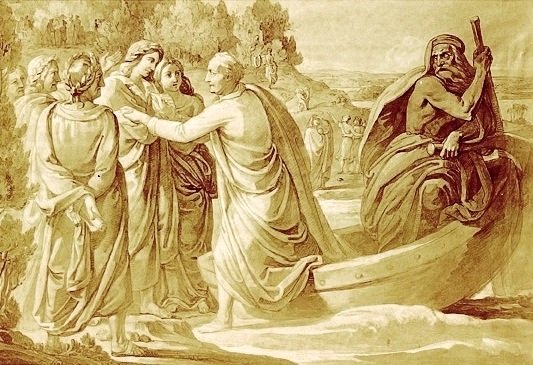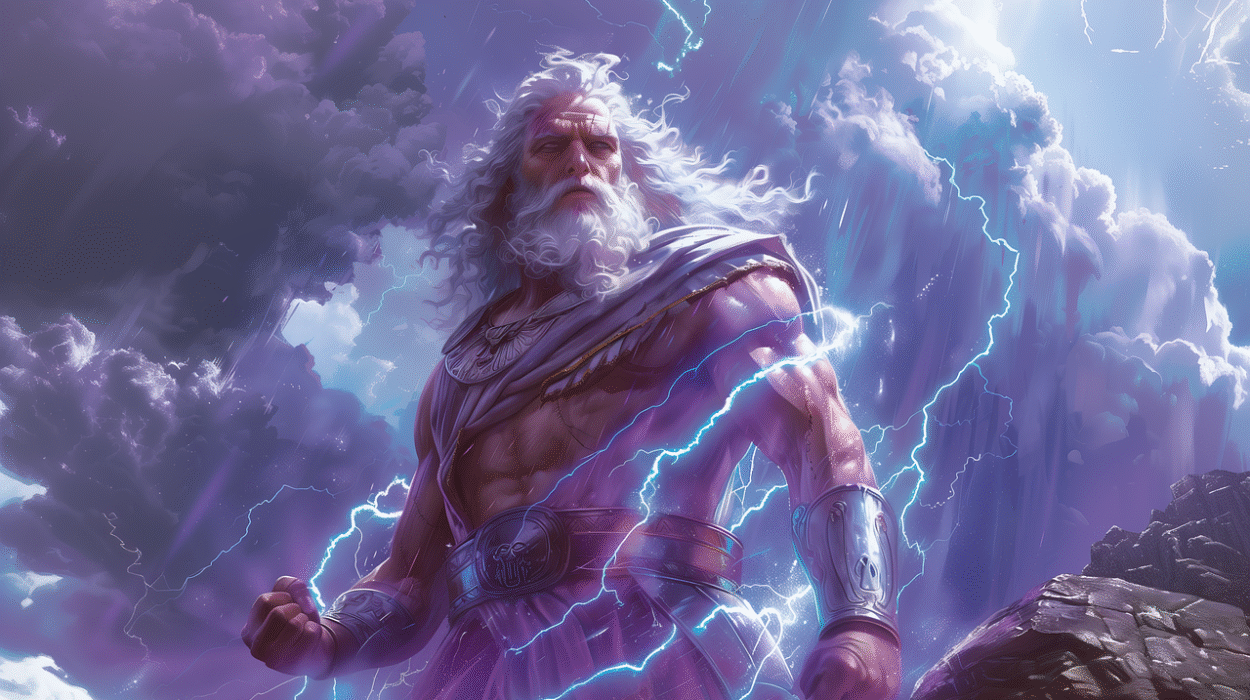Across the myths of humankind, heaven has always shimmered in our collective imagination as a place of peace, reward, and eternal beauty. In Greek mythology, this vision took form as the Elysian Fields—a paradise reserved for the most heroic, virtuous, and favored souls. For the ancient Greeks, whose world was filled with gods who often appeared capricious and unpredictable, the Elysian Fields represented something profoundly hopeful: the possibility of everlasting joy after a life of struggle.
To understand the Elysian Fields is to glimpse the Greek conception of life, death, and what lies beyond. Unlike the shadowy gloom of Hades or the endless wandering in the underworld’s plains, the Elysian Fields were imagined as bright, blooming meadows, where soft breezes carried the scent of eternal spring. Here, the souls of heroes played games, listened to music, and lived in bliss forever. The Elysian Fields were the Greeks’ answer to humanity’s deepest yearning—a place where pain, loss, and mortality no longer held power.
The Origins of Elysium
The term Elysium or the Elysian Fields (Greek: Ἠλύσιον πεδίον, Ēlýsion pedíon) emerges in early Greek poetry, where it is described as a dwelling place for exceptional mortals after death. Its origins are somewhat mysterious, with scholars debating whether the idea was purely Greek or influenced by older Mediterranean or Indo-European traditions of a blissful afterlife.
Homer’s Odyssey, one of the earliest surviving Greek works, offers one of the first mentions of this paradise. There, Menelaus—husband of Helen of Troy—is told that he will not die but instead be sent to the Elysian plain, “at the world’s end, where life is easiest for men.” This early description places Elysium not underground but at the edge of the world, where gentle breezes and endless spring exist. Later poets, like Hesiod and Pindar, would expand upon this imagery, cementing Elysium as a realm of reward and eternal delight.
By the time of later Greek thought, particularly under the influence of philosophers like Plato, the concept of Elysium became more connected to ideas of moral virtue and the soul’s purification. The Elysian Fields thus evolved from a mythic meadow of heroes to something closer to a spiritual heaven, reflecting how Greek culture itself shifted in its understanding of life after death.
Geography of the Afterlife
In Greek cosmology, the afterlife was a vast and varied realm. The souls of the dead generally journeyed to the underworld, ruled by Hades, where they dwelled as shades with little memory or vitality. Yet the underworld was not uniform; it was divided into regions, each with its own purpose and quality of existence.
The Asphodel Meadows were a gray, neutral plain where ordinary souls wandered in forgetfulness. Tartarus, by contrast, was a pit of torment, reserved for the wicked, the impious, and those who had committed crimes against the gods. And then, beyond these places, lay Elysium—the reward of the blessed.
Unlike Tartarus or the Asphodel Meadows, the Elysian Fields were described as being located in the far west, sometimes across the Ocean at the ends of the earth. The west was symbolically important to the Greeks, associated with the setting sun, endings, and the mystery of death. In this symbolic geography, the Elysian Fields became the ultimate destination of the fortunate few—a garden of light beyond the mortal horizon.
Who Was Worthy of Elysium?
Not every soul could hope to enter the Elysian Fields. In early myth, admission was granted mainly to heroes, demigods, and those favored by the Olympians. Figures like Achilles, Menelaus, and other legendary warriors of the Trojan War were often imagined to dwell there, rewarded for their courage and their extraordinary deeds.
But as Greek thought matured, Elysium became more closely linked with moral virtue and philosophical ideals. The philosopher Plato, in particular, envisioned the Elysian Fields as a destination for souls that had lived justly, embraced wisdom, and achieved purity. In this sense, Elysium was no longer only for heroes of strength but also for heroes of the spirit.
Some accounts also describe a process of reincarnation. A soul could be reborn several times, but if it lived righteously through three lifetimes, it would finally earn eternal rest in Elysium. This belief reflects a growing sense among Greeks that the afterlife could serve as both reward and justice.
The Landscape of Eternal Bliss
Descriptions of the Elysian Fields vary, but all share a vision of abundant natural beauty. Poets described them as wide, sunlit meadows, filled with flowering groves, murmuring rivers, and fields of golden grain. Unlike the mortal world, where seasons brought hardship, famine, and death, in Elysium there was eternal spring. The air was gentle, the sky always clear, and life was effortless.
Souls in Elysium were free of toil and suffering. They played music, danced, feasted, and conversed with one another in joy. Some sources describe contests of skill or athletic games—echoing the importance of competition in Greek life—but without the bitterness of loss.
In Elysium, the soul retained its individuality and vitality. Unlike the shades of the Asphodel Meadows, who drifted in forgetfulness, the blessed dead enjoyed memory, identity, and awareness. This was not mere existence—it was life perfected.
Elysium and the Heroes
Many of Greece’s legendary heroes were said to dwell in Elysium. Achilles, whose short but glorious life defined the Iliad, was often imagined among its meadows, his wrath and suffering finally put to rest. Menelaus, husband of Helen, was promised this fate by the gods. Cadmus and Harmonia, mythic rulers of Thebes, were said to live eternally in this paradise, transformed into serpents as symbols of renewal and immortality.
In these stories, the Elysian Fields serve as both reward and reconciliation. Heroes who endured great suffering in life found eternal joy in death. The battlefield’s blood was washed away by the meadow’s soft streams. In this way, Elysium reflects the Greek idea that life’s struggles were not meaningless—that beyond tragedy, there was the promise of peace.
The Influence of Elysium on Greek Religion
The concept of the Elysian Fields profoundly shaped Greek religious practices. Mystery cults, such as those at Eleusis, promised initiates a blessed afterlife, possibly in Elysium, if they embraced the rites of Demeter and Persephone. These cults emphasized the hope of immortality and the triumph of life over death, offering participants a vision of salvation beyond the grave.
Elysium thus became more than a myth—it was a spiritual goal. For many Greeks, the promise of joining the blessed dead inspired devotion, piety, and ethical living. In a culture that often emphasized the unpredictability of fate, the idea of a just and beautiful afterlife was deeply comforting.
Philosophical Visions of Paradise
As Greek philosophy blossomed, so too did new interpretations of the Elysian Fields. For Plato, the Elysian Fields represented the highest state of the soul, a place of reward for those who had lived in harmony with reason and justice. He spoke of the afterlife not merely as a reward but as a continuation of the soul’s eternal journey.
The Stoics and other philosophical schools also reflected on Elysium, sometimes treating it symbolically rather than literally. For them, the paradise of the soul could be found in wisdom, virtue, and inner peace—qualities that mirrored the harmony of the mythic Elysian Fields.
In these interpretations, Elysium became both a mythic place and a metaphor: the embodiment of the human longing for peace, justice, and eternal meaning.
Comparisons to Other Heavens
The Elysian Fields are part of a broader human tradition of imagining paradise. In Norse mythology, warriors longed for Valhalla, the great hall of Odin where they feasted and trained for the final battle of Ragnarök. In Egyptian belief, the righteous entered the Field of Reeds, a lush version of Egypt itself where life continued in abundance. In Christianity, the faithful were promised Heaven, a place of eternal communion with God.
Each of these visions reflects the values of its culture. For the Greeks, who revered heroes, competition, and the beauty of nature, Elysium was a meadow of harmony and reward, echoing the values of their world. To study Elysium is to see not only Greek mythology but also the universal human impulse to dream of life perfected.
Elysium in Art and Literature
The vision of the Elysian Fields has inspired countless works of art, literature, and music throughout history. Ancient vase paintings sometimes hinted at the paradise beyond death, while later Roman poets like Virgil in the Aeneid described Elysium in vivid detail. Virgil’s vision of Aeneas visiting his father Anchises in the Elysian Fields deeply influenced Roman culture and, later, Christian thought about paradise.
Even beyond antiquity, Elysium has persisted as a symbol. Poets of the Romantic era used it to evoke beauty and transcendence. Modern writers and artists still invoke Elysium to express the idea of peace after struggle, of eternal spring after winter. The name itself has entered everyday language, where “Elysian” means heavenly, blissful, or divine.
The Emotional Power of Elysium
Why does the idea of the Elysian Fields still resonate so powerfully today? Perhaps it is because the myth touches something universal in the human heart. Life, for the Greeks as for us, was often filled with hardship, loss, and uncertainty. The hope of a paradise—a place where joy and peace reign eternally—offered comfort against the inevitability of death.
In Elysium, the Greeks imagined not just an escape from suffering but a continuation of life’s best moments. Music, conversation, companionship, beauty, and memory—all the things that give life meaning—were promised forever. It was not oblivion, but fulfillment.
Elysium as a Reflection of Humanity
Ultimately, the Elysian Fields tell us as much about the Greeks as about their gods. They reveal a people who longed for meaning, justice, and reward beyond the often harsh realities of their world. They show us a culture that celebrated both physical heroism and the virtues of the soul. And they remind us that myths are not only stories of gods and heroes—they are mirrors of human hope.
Elysium was, and remains, a vision of humanity’s highest dream: that beyond the trials of life, there waits a meadow of eternal peace, where the soul may finally rest.
The Eternal Spring
The Elysian Fields endure in imagination because they represent something timeless. Whether envisioned as literal meadows at the world’s end or as a symbolic state of the soul, they embody the longing for eternal spring after the winters of existence.
In Greek mythology, where gods often punished as much as they blessed, Elysium stands out as a beacon of mercy, beauty, and reward. It is heaven not in the abstract, but heaven made tangible: sunlight, flowers, laughter, and endless joy.
The ancients may have passed, but their vision of Elysium still blooms in the human imagination. Whenever we picture a paradise where suffering fades and happiness never ends, we walk, if only in thought, through the fields of Elysium.






